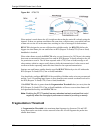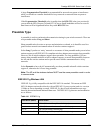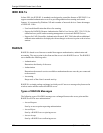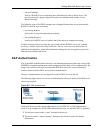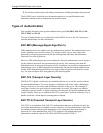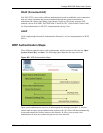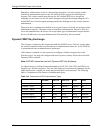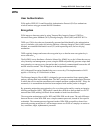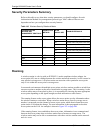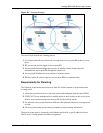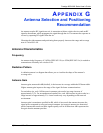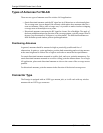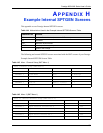
Prestige 660H/HW Series User’s Guide
403 Splitters and Microfilters
Security Parameters Summary
Refer to this table to see what other security parameters you should configure for each
Authentication Method/ key management protocol type. MAC address filters are not
dependent on how you configure these security features.
Table 143 Wireless Security Relational Matrix
AUTHENTICATION
METHOD/ KEY
MANAGEMENT PROTOCOL
ENCRYPTION
METHOD
ENTER
MANUAL KEY
ENABLE IEEE 802.1X
Open None No No
Open WEP No Enable with Dynamic WEP Key
Yes Enable without Dynamic WEP Key
Yes Disable
Shared WEP No Enable with Dynamic WEP Key
Yes Enable without Dynamic WEP Key
Yes Disable
WPA WEP No Yes
WPA TKIP No Yes
WPA-PSK WEP Yes Yes
WPA-PSK TKIP Yes Yes
Roaming
A wireless station is a device with an IEEE 802.11 mode compliant wireless adapter. An
access point (AP) acts as a bridge between the wireless and wired networks. An AP creates its
own wireless coverage area. A wireless station can associate with a particular access point
only if it is within the access point’s coverage area.
In a network environment with multiple access points, wireless stations are able to switch from
one access point to another as they move between the coverage areas. This is roaming. As the
wireless station moves from place to place, it is responsible for choosing the most appropriate
access point depending on the signal strength, network utilization or other factors.
The roaming feature on the access points allows the access points to relay information about
the wireless stations to each other. When a wireless station moves from a coverage area to
another, it scans and uses the channel of a new access point, which then informs the access
points on the LAN about the change. The new information is then propagated to the other
access points on the LAN. An example is shown in
Figure 267 on page 404.
If the roaming feature is not enabled on the access points, information is not communicated
between the access points when a wireless station moves between coverage areas. The
wireless station may not be able to communicate with other wireless stations on the network
and vice versa.



